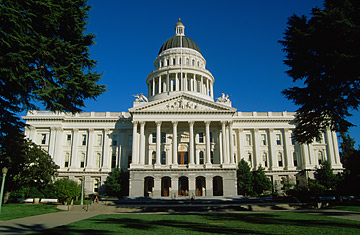
California state capitol building
National Conference of State Legislatures
23 pages
The Gist:
Kudos to California! On July 20, the Golden State finally cobbled together a plan to bridge its $26.3 billion budget gap, leaving North Carolina, Connecticut and Pennsylvania as the only states that have not yet reached an agreement. But before lawmakers start slapping backs, they should know that next year's budget crunch could be even tighter. Thanks to dwindling revenues, paltry collection rates and the economic storm soaking taxpayers, the $142.6 billion budget shortfall that states faced during the 2009 fiscal year is but one hurdle in a longer financial gauntlet, according to this bleak assessment from the National Conference of State Legislatures (NCSL). Corina Eckl, the NCSL's fiscal program director, recently compared the endless waves of grim economic forecasts to "breaking your leg and then getting pneumonia." Cheery stuff.
Highlight Reel:
1. On reaching 2009 budget agreements: "Some might think that state lawmakers are uttering a collective sigh of relief now that most have their new budgets in place, but that is not the case. Dread is more like it. If FY 2010 budgets follow a pattern similar to the ones in the past two years, new gaps will emerge after the fiscal year begins—in fact, some states already are reporting new shortfalls just weeks into the new fiscal year."
2. On the hurdles ahead in 2011 and 2012: "Nearly two-thirds of the states already project a budget gap in FY 2011. Of the remaining states, many note that it is simply too early to know if a gap will occur, although several indicated that one is likely. The size of these projected gaps raise warning sirens—loud ones. Several states will need to close double-digit budget gaps yet again."
3. On how the crisis could persist: "If the recession lingers (as some economists suggest), economic growth is particularly tepid (as some economists warn), or the nation dips into another recession (as some economists predict), state fiscal problems would obviously last longer. This all underscores an unfortunate fact: Without a doubt, lawmakers' endurance to resolve extraordinary fiscal problems will be tested for years to come."
The Lowdown:
This document is the Saw of state-budget reports: a sadistic statistical journey that gets uglier the deeper you delve. In persuasive, insistent language, the authors hoist one red flag after another. They also underline a worthwhile point: for all the grumbling about the deficiencies of the economic-stimulus package, it has have been the glue holding states' tattered budgets together. And the boost it has offered will inevitably wane. "Several revenue failures are generating a lengthy chain of acute budget gaps," the report notes. "Because the current state fiscal crisis began in FY 2008, many states are looking at a minimum of four to five years of deep fiscal problems." The headline of one ominous section — "The Foreboding Future" — is really all you need to know. The rest is mostly just recession gore.
The Verdict: Skim.
